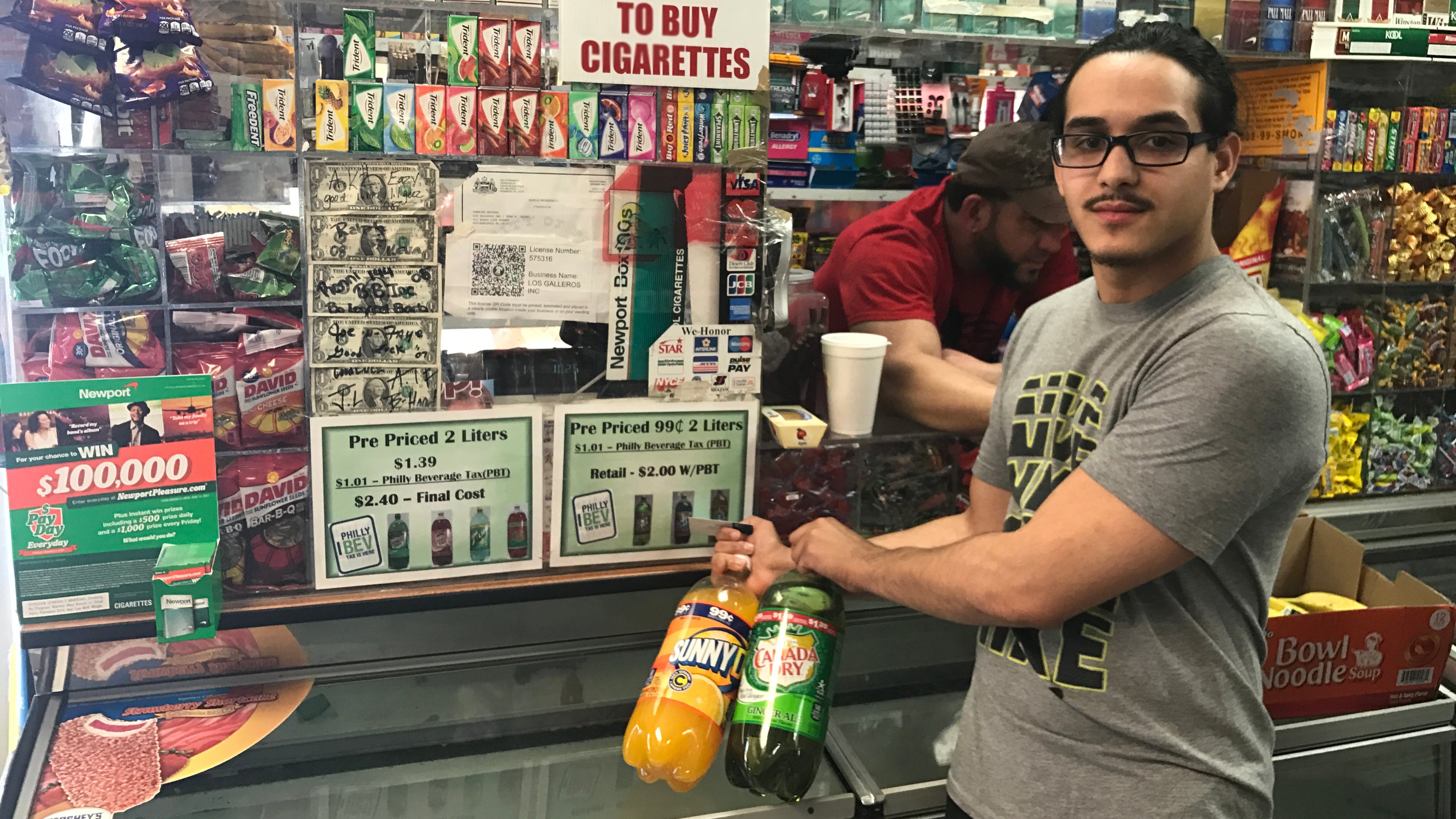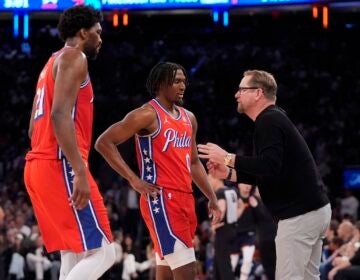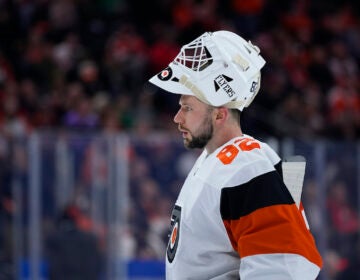Supporters of Philly’s soda tax label claims of lower sales ‘hype’
Listen
Frayby Perelta holds up 2-liter bottles of soda that are now mislabeled with the wrong price because of Philadelphia soda tax. A sign in the bodega he operates explains that the tax has doubled the price. (Bobby Allyn/WHYY)
As Philadelphia awaits a decision from a Pennsylvania appeals court about whether the city’s soda tax will be declared legal, another debate is raging in cornerstores across the city.
Beverage companies are blaming the 1.5-cents-per-ounce tax for declining store sales, plant layoffs and other pains.
But backers of the new levy say another thing is fueling the bad-news-for-business headlines: hype.
To Michelle Murray, it looks like more than just hype.
“Oh my goodness. Oh, that’s ridiculous,” exclaimed Murray as she browsed the soda aisle of her neighborhood bodega in North Philadelphia.
The new tax can add up to $2 to the price of a 12-pack, and 18 cents to a can of soda. This all adds up to sticker shock for some buyers.
“$1.80 for a 16-once Pepsi? That’s just too much money for me,” Murray said.
Murray opted for an tea instead. Consumers are increasingly opting for unsweetened drinks, according to Philadelphia retailers. Some shops are even reporting a 50-percent drop in soda sales.
“People are angry and furious,” said Frayby Perelta, who runs a small family-owned bodega.
When customers scream at him about price hikes, and he said they often do, he points to a sign affixed next to the register explaining that those 99-cent decals on the 2-liter bottles? They’re wrong. With the tax, it’s now two bucks.
“There’s a lot of kids who come here with 75 cents and cannot even barely, barely buy a chip,” Perelta said. “And now soda, they used to buy back then, or juice. It’s not just affecting us, it affects everyone.”
Pepsi announced up to 100 layoffs at area distributions plants. The soda giant said it also will be pulling 2-liters and 12-packs form the shelves. Both decision, the company said, were driven by the tax.
Meanwhile, Philadelphia city officials claim the soda industry is scapegoating the tax for the effects of economic forces that took hold long before the tax started.
Analyst Jack Russo, who studies consumer patterns at the St. Louis-based investment firm Edward Jones, said there is some validity to that.
“We’re seeing declines in carbonated soft drinks consumption, not only regular, but also diet, and we’ve seen those trends for a long period of time,” Russo said.
So which side is right? Russo said it’s a little bit of both. Supporters of the tax pointing to overall trends of people drinking less soda and companies trending toward smaller package sizes is true, but Russo admitted: the Philadelphia tax is likely accelerating that trend.
“Consumers having to pay more for their favorite product,” he said. “That usually doesn’t go over real well.”
But while the soda industry tells people to talk to mom-and-pop store owners and irate customers to understand the ills of the tax, the city often tells critics to take a walk in one of the new free pre-kindergarten programs that the tax is supporting.
The tax is projected to bring in around $92 million each year.
Some of that money will support expansions at the two pre-K centers operated by Damaris Alvarado-Rodriguez. At one of them, Children’s Playhouse in South Philadelphia, she has added 30 kids since the tax started in January.
She has also hired staff, including the previously-unemployed mother of one of the children attends the program.
“When they’re upset and they say, ‘well, you know, we’re going to lose our job,’ and I like, ‘well, I’m hiring,'” said Alvarado-Rodriguez. “I really feel bad for the merchants and the small-business owners, but I also look at the positive effects for the children, and the long-term effects for the city.”
She’s planning to expand the second floor of her center in preparation for an additional 80 seats.
But her expansion hinges on one unpredictable factor: the outcome of a lawsuit filed by the beverage industry now being considered by a panel of Commonwealth Court judges.
No decision date has been set.
Alvarado-Rodriguez’s pre-school, shop owners and soda industry workers all have a lot riding on the court’s decision.
“We’re going to move forward regardless,” Alvarado-Rodriguez said. “I just have to trust the system and hope that the judges will rule fairly.”
WHYY is your source for fact-based, in-depth journalism and information. As a nonprofit organization, we rely on financial support from readers like you. Please give today.




